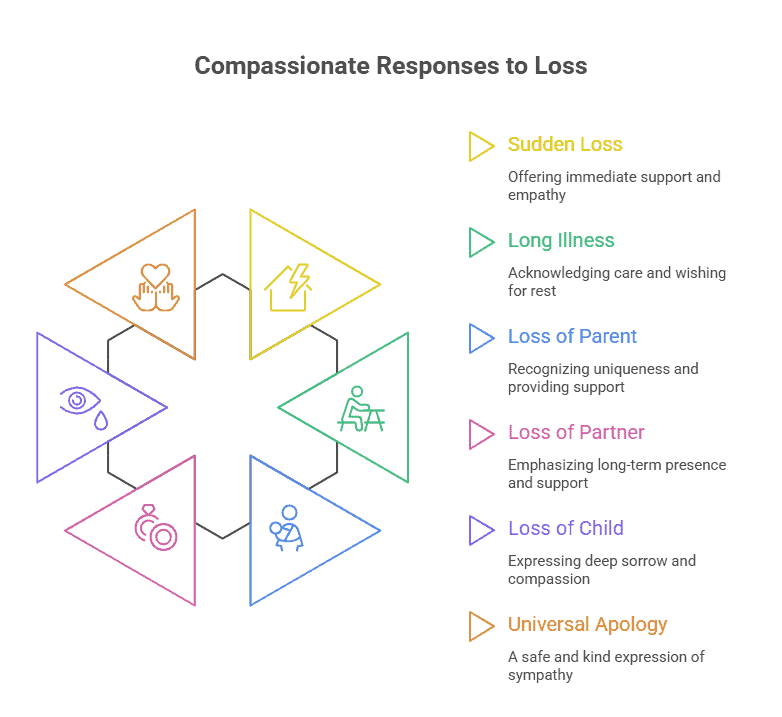Those are moments everyone dreads arriving-too full of expected sorrow. The message arrives, the call comes, or you see the post-someone you know has lost a loved one. You freeze. Heartbreaking is what you wish for them, but your mind goes blank. What do you say when an individual has passed away? You want to comfort them-but you are afraid that you will say the wrong thing.
The truth is that it does not deal with merely saying the right words; it is about coming with sincerity, kindness, and presence-even if this is all you can offer: “I’m so sorry for your loss”. Let us explore how condolences can be offered to those grieving for the assistance they truly need.

The Heart of It: Why Your Words Matter
Silence can really be louder than words when someone is buried with their departed. Saying something, even if it is brief, is to acknowledge their pain. It says they are not alone.
Please keep it simple. This is not the time for long speeches, life lessons, or accidental philosophy. Avoid trite sayings such as “time heals all wounds.” Speak from your heart. Some of the most comforting words measure fewer than ten syllables: “Here for you.”
This is their story, not yours. You might have had a similar experience, but the loss is always different from the previous one. In lieu of stating, “I precisely understand your sentiment,” it is better to express, “I just can’t comprehend what you are going through; it must be very tough for you now.” By this simple sentence, you give people their dignity through their own pain, all the while keeping the compassion.
If you ever feel tempted to start a condolence sentence with “At least…”, take a deep breath, step away from the keyboard, and start again.
Simple, Sincere Phrases You Can Say
Sometimes, you don’t need fancy words — just gentle honesty. Here are some ways to express sympathy that never go out of style:
Expressions of Sympathy
- “I’m so sorry for your loss.”
- “My deepest condolences to you and your family.”
- “I’m thinking of you during this difficult time.”
- “They’ll be deeply missed by everyone who knew them.”
Offering Support (the meaningful way)
- “If you want to talk or just sit alone, I’m here for you.”
- “Is it possible for me to bring dinner on Wednesday or manage your errands during the week for you?”
- “I don’t need an answer — just letting you know that you are in my thoughts.”
Honouring Their Loved One
- “Your father had a gift for making people laugh — I’ll never forget that.”
- “She touched so many lives, mine included.”
- “We’ll always cherish their memory.”
An important thing is not to overthink it. People who are grieving will rarely remember the exact words that you said — they will remember how your presence made them feel, instead.
What Not to Say When Someone Has Died
Even the most positive and well-intentioned words can sometimes not be received well. One other very important thing to be considered alongside pondering over the right words to say to someone who is no more is to be aware of the kinds of things that shouldn’t be said.
Avoid phrases that try to fix or explain away their grief. Examples include:
- “They’re in a better place.”
- “Everything happens for a reason.”
- “Be strong.”
- “At least they lived a long life.”
Nobody is comforted by any of these shows. They inadvertently tell the bereaved to get over it immediately, when what they need the most is the freedom to be sad. If your message could be on a cute poster, it may not be the best one for sympathy.
Tailor Your Words to the Relationship and Situation

Every loss is different. A few examples:
- Sudden loss: “This must be so shocking. I’m deeply sorry. I’m here for anything you need.”
- After a long illness: “The way you took care of me and showed love all the time was really amazing. I hope that now, you will be able to find some rest too.”
- Loss of a parent: “A mother/father is a unique person—there is no one else like them. I will support you through this time.”
- Loss of a partner: “Absolutely, I can’t imagine how one could ever fill the void that must be there, but I am going to be here – not just today, but in the months to come.”
- Loss of a child: “It is not appropriate to even try to come up with any words that could express the deep grief, but please, please know that I have you in mind all the time and I send you my love and compassion in your sorrow.”
And when in doubt, “I’m so sorry” is always safe, always kind.
Choosing the Right Way to Reach Out
Different situations call for different forms of comfort:
Text message: “Thinking of you today. I can drop off groceries or dinner this evening if that helps.”
Card: A short note acknowledging the loss, a fond memory, and an offer of help.
Email: In professional contexts, express sympathy while keeping tone formal yet warm:
“On behalf of our team, please accept our condolences. We’re here to support you in any way you need.”
In-person: Sometimes just saying “I’m so sorry” and giving a quiet hug says everything that needs to be said.
This is one time when “thoughts and prayers” shouldn’t be autocorrected to “thoughts and players.” True story.
Actions Speak Louder Than Words
Words are important, but actions bring real comfort. Grief drains energy — so practical help can mean the world. You could:
- Cook or order meals.
- Handle school runs or pet care.
- Offer help with paperwork or errands.
- Organise a memory album or photo slideshow.
- Simply sit with them — in silence, if needed.
The smallest act of kindness can create a huge ripple of relief.
Remember that support is not something that can be quickly achieved. It would be nice to keep in touch with them and do so more frequently when the others are celebrating their birthdays or when the anniversaries are near. A quick message like “Just thinking of you today” could turn any of the gloomiest days into a little sunnier.
Grief doesn’t follow a timeline — and neither should compassion.
Final Thoughts
There must have been moments when you were unsure about what to say about the death of a person. If so, remember that the objective is not to be perfect but to be there. Just utter a simple and sincere word, give a concrete helping hand, and continue to be around. Words fail mourning folks, but they live to feel someone cares and to lean on.
About Inner Peace Therapies: Healing After Loss
Losing a beloved person can elicit severe emotional suffering and sometimes revive past trauma. Inner Peace Therapies acknowledges that grieving is such a powerful process that it may affect not only your emotions but also your sleep, relationships, and most significantly, your security.
Our therapists are using a trauma-informed approach to gently and safely help you deal with your grief. We concentrate on trust-building, the teaching of emotional regulation, and facilitating your reconnection with the ground of your being. The approach is tailor-made for each client— one that encompasses caring, EBT-oriented therapy, and understanding the healing process.
If a death in the family has left you feeling numb, anxious, or unable to move forward, remember that healing is possible. You don’t have to face it alone. Let us walk with you on your journey toward peace, healing, and self-understanding — with the support of trauma Illinois specialists who truly care.





